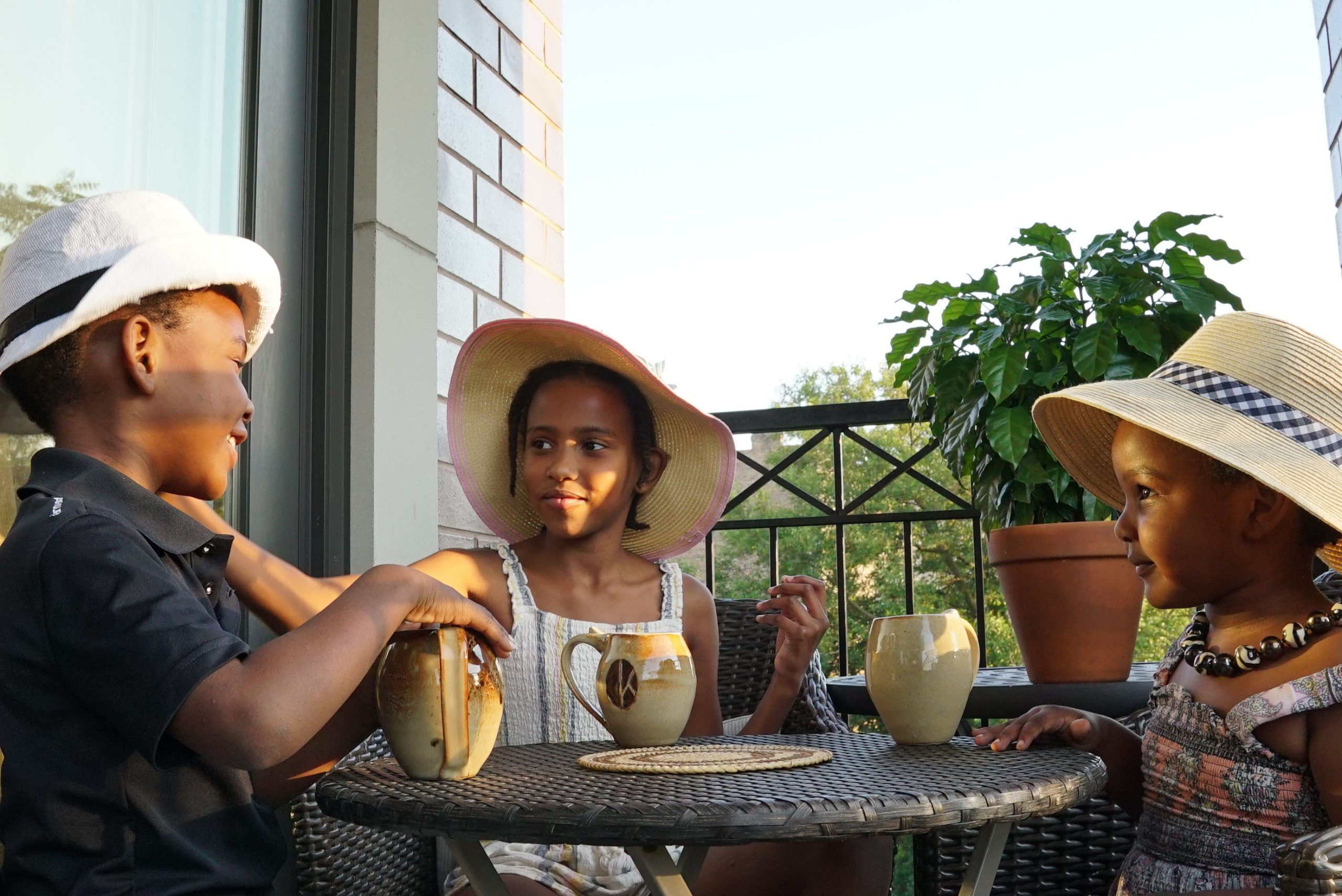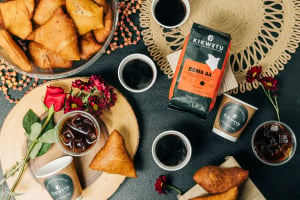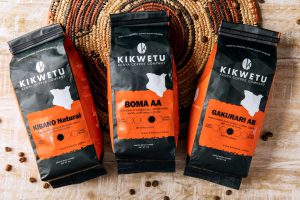Small Business Spotlight: Big Plans are Brewing For Kikwetu Kenya Coffee Company

Kikwetu Kenya Coffee Company founders Leecox and Martha Omollo
With three young children and a full-time job as a technology executive, Leecox Omollo has to be intentional about how he spends his spare time.
So as he and his wife, Martha, grow Kikwetu Kenya Coffee Company from a pet family project into a profitable business, they’ve thought carefully about why it’s a worthwhile endeavor.
“For us to say, ‘Let’s add something else,’ it had to have some meaning,” Omollo said. “Making it a compelling ‘why’ was the hardest part.”
Kikwetu, a Chicago-based specialty coffee company that has become a staple of area farmers markets and is starting to appear on retail shelves, has grounded its purpose in fostering community and connections between people and places, specifically between the founding couple’s native Kenya and their adopted home in Chicago.
An alumnus of the Polsky Center’s Small Business Growth Program, Kikwetu sources its direct-trade coffee beans from small farms in Kenya and serves creative, handcrafted drinks featuring local ingredients. Across Chicago, you can find them at corporate catering events, farmers markets and pop ups.
Counter to the rushed on-the-go coffee culture, Kikwetu’s ethos encourages customers to slow down and relate to their fellow humans.
“We are on a journey to create a coffee company that creates connections,” said Omollo, who lives in Chicago’s Woodlawn neighborhood. “We are passionate about finding people from all over the world and the things that bind us together.”

The Omollos’ three children — Nia, 11, Ari, 8, and Zoe, 5 — help market Kikwetu.
The idea for Kikwetu was sparked by Omollo’s own feeling of connection. During a business trip in Michigan, Omollo stopped into a small coffee shop in Grand Rapids and fell in love with the coffee, which he learned came from Kenya. For Omollo, who was born and raised in Nairobi, and went to college and graduate school in Michigan before getting his MBA at Northwestern University’s Kellogg School of Management and settling in Chicago, it felt like a bridge between his two worlds.
As the notion of starting his own coffee company percolated in his imagination, serendipity stepped in. While commuting home from a consulting job in suburban Libertyville, Omollo grew cold waiting for the train and noticed a coffee roaster across the tracks. He went in and met the owner of Hansa Coffee Roaster, who became his coffee mentor and, eventually, his roaster, making the small-batch, specialty-grade coffee that sets Kikwetu apart.
“There is a lot of human connection that goes into bringing Kikwetu coffee into the world,” Omollo said. “There is no Kikwetu without the Kenyan farmers that tend to the crops and make sure that it is quality, there is no Kikwetu without someone willing to give up their time and not see us as a competitor but as someone whose story needs to be told. There is no Kikwetu without customers and employees that deeply believe in what we are building.”
Though the Omollos started working on Kikwetu in 2014, it didn’t pick up steam until 2018.
That’s when they pitched their first tent at the Hyde Park Farmer’s Market, hoping to have a little fun and maybe sell a few bags of coffee beans. They did not expect to sell out in 30 minutes.
The next week they brought more bags and a few coffee pots to brew on site, and the week after that they brought homemade mandazi, a snack of deep-fried dough that is popular in Kenya and elsewhere in Africa, similar to the beignets of New Orleans.

The mandazi proved to be a turning point for Kikwetu, as shoppers from varied nationalities flocked to the tent at the familiar sight. One of those shoppers was the Polsky Center’s Isra Omar, whose native Somalia has a version of mandazi. Omar, who manages the Small Business Growth Program, encouraged Kikwetu to apply to the program.
For 10 weeks in fall of 2019, Omollo worked with a team of Chicago Booth students to create a growth plan for Kikwetu. The outside perspective gave structure to their “amorphous dreams” and was transformative for the business.
“They opened our eyes that this could be a bigger opportunity than the fun we were having,” Omollo said. “We talked a lot about amplifying our story and creating differentiation in a crowded marketplace.”
Since then, Kikwetu has expanded to more than a half dozen farmers markets, including Green City, West Loop, South Loop, Hyde Park, Logan Square, North Center, and Wicker Park, drawing long lines of customers and employing 20 people part-time during the season. Martha Itulya-Omollo left her 20-year career in catering at Hilton Hotels to work full time in the business.
Last year, Kikwetu turned a profit for the first time.
Kikwetu’s growth strategy includes hosting more pop-up events, expanding online sales, and offering catering, including coffee and tea service for corporate team events and condo buildings. It also is establishing retail partnerships, and since November Kikwetu coffee beans have been on the shelves at Dom’s Kitchen and Market. Omollo hopes to catch the eye of retailers focused on featuring local brands, such as Foxtrot Market.
Down the road, Omollo aspires to open a destination coffee shop that embodies Kikwetu’s community ethos and celebrates both Kenya and Chicago.
“I think the biggest service an immigrant can have in the U.S. is to build a bridge back to where they came from,” Omollo said. “This is what makes the U.S. special. And this is what makes Chicago a world-class city.”
Article by Alexia Elejalde-Ruiz, associate director of media relations and external communications at the Polsky Center. A longtime journalist, Alexia most recently was a business reporter with the Chicago Tribune. Reach Alexia via email or on Twitter @alexiaer.